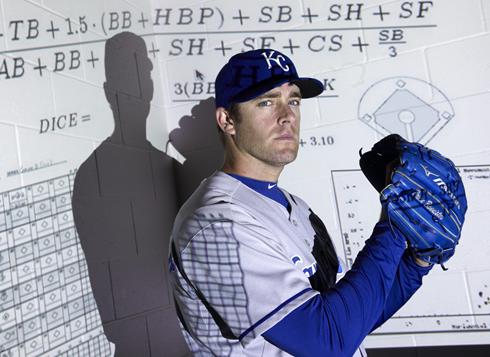
This is some pretty deep stuff from Oakland Athletics general manager Billy Beane, who went out there earlier this month and acquired two top-of-the-rotation starting pitchers for the best team in baseball.
Beane is well-known around baseball as a genius. And his most recent piece of advice/work gives us a deeper understanding of how his mind works and where the sports world might very well be heading.
Beane wrote an opinion piece for The Wall Street Journal that discusses the potential of a tech-driven revolution in sports.
Baseball—my passion and profession for three decades—has been at the forefront of the analytics revolution sweeping through sports. And the game is just beginning.
The proverbial tip of the iceberg: Statcast, a 3-D tracking system that provides detailed metrics on the locations and movements of the ball, the players, and even the umpires. While the system is currently installed in only a handful of ballparks, Major League Baseball plans for all 30 stadiums to have it by 2015.Eventually, such systems will proliferate not just through the ranks of all professional sports but to youth sports, affecting everything from how games are taught to the statistical nomenclature of sport.
If you read through the Ivy League-like talking points here, Beane is discussing the potential that all ballparks within MLB will have a tracking stystem that will take us to an entirely new level of sabermetrics and statistics.

Courtesy of USA Today
Where exactly does a player hit the ball within a few-feet radius when going to right field? What about center field? We already know teams play hitters (somethimes based on the pitcher) to pull the ball or go opposite field. What if teams could then increase the chances of one of their fielders being at the right spot at the right time?
What if hitting coaches could track where a specific pitch is going to go in a specific situation based off a pitcher throwing a fastball, curve ball or change up? And then take that to an entirely new level by indicating the velocity of the ball and what count the at-bat is currently in may play a role in its location.
This can also be utilized from a scouting standpoint, as Beane indicates.
Increased demand for the technical skills required to interpret the “big data” produced by 3-D tracking systems also will dramatically change the composition and demographics of front offices, which historically have drawn on former players. Competing to hire those best equipped to glean insights from the new data regardless of their backgrounds will be a welcome trend in an industry that has actively sought ways to improve its diversity.
 Is this the beginning or the end for old-school scouts around baseball? We saw Brad Pitt portray Billy Beane in Moneyball, which at times focused on the issue Beane ended up having with former scout Grady Fuson when he brought Paul DePodesta in as assistant general manager. While given the Hollywood spin, that one aspect of Moneyball seemed to have some truth to it.
Is this the beginning or the end for old-school scouts around baseball? We saw Brad Pitt portray Billy Beane in Moneyball, which at times focused on the issue Beane ended up having with former scout Grady Fuson when he brought Paul DePodesta in as assistant general manager. While given the Hollywood spin, that one aspect of Moneyball seemed to have some truth to it.
In short, former players will soon be replaced (in large numbers) by statisticians and higher education types. In fact, it’s already happening.
Beane wraps up with a solid point.
The one constant in the future of sports will be the game that is played between the lines; baseball, in particular, embraces historical continuity. But what drives the game—those who play it, how their play is evaluated, and those who make the evaluations—will fundamentally change. As we have seen in other societal realms, technology is driving sports down the road toward increased access, diversity and meritocracy.
Are you ever unnerved by the talking heads on television, who happen to be former players? A vast majority of them earned that gig based solely off his/her playing career. Now imagine them being replaced with another segment of the sports world that understands the statistical and video aspect of analyzing sports. Would we be better off with the latter?
In the future, meritocracy could potentially combine with technology to give everyone a better understanding of the nuances of the sports we love. In a vacuum, that sounds like something we should all support.
In any event, here is the link to Beane’s op-ed piece. We recommend you give it a read.
Photo: Examiner